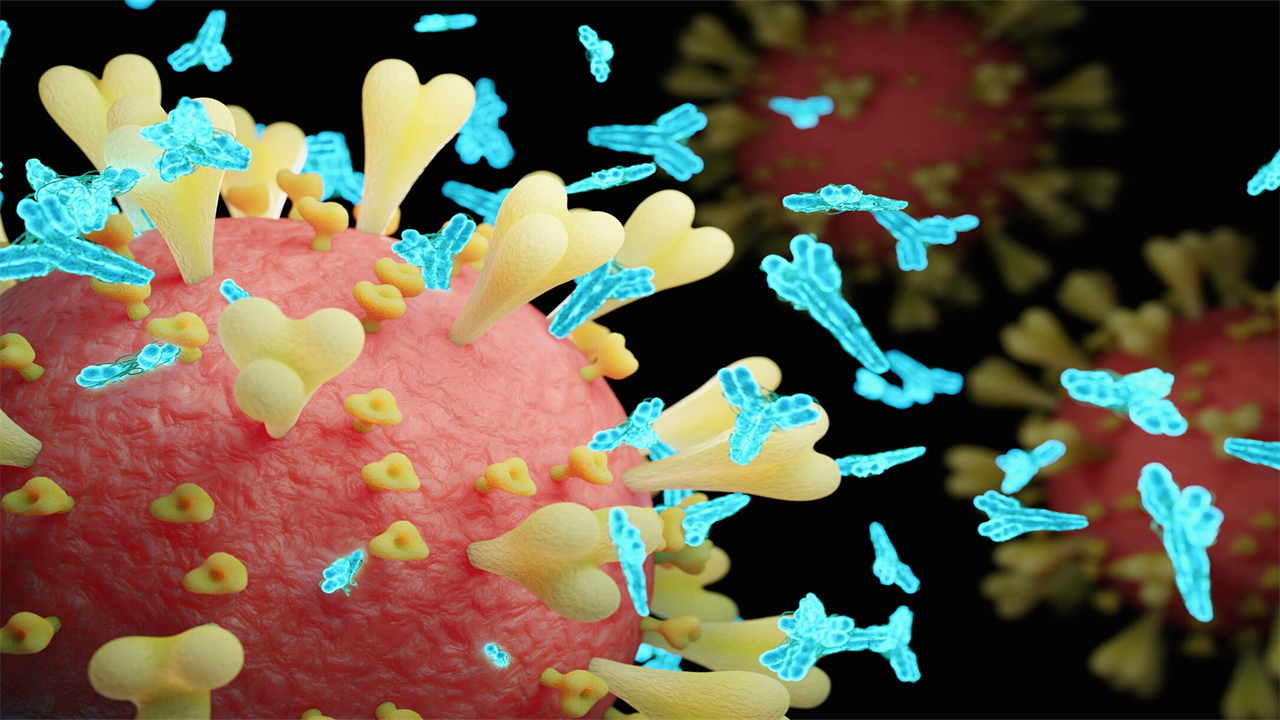Exposure to Harmless Coronaviruses Boosts COVID-19 Immunity
0 View
Share this Video
- Publish Date:
- 23 November, 2021
- Category:
- Covid
- Video License
- Standard License
- Imported From:
- Youtube
Tags

Strong antibody responses to harmless coronaviruses also partially protect against SARS-CoV-2.
Infections with the new coronavirus and vaccination lead to strong antibody responses against SARS-CoV-2. Immune responses to other human coronaviruses, which usually only cause harmless colds, also offer some protection against SARS-CoV-2. This cross-reactive immune response is an important piece of the puzzle of how to achieve comprehensive immunity to the coronavirus, researchers at the University of Zurich have shown.
The population’s immunity to SARS-CoV-2, achieved through infection or vaccination, is critical to overcoming the COVID-19 pandemic. A team of researchers led by the University of Zurich (UZH) has now discovered another component that contributes to SARS-CoV-2 immunity: previous antibody responses to other, harmless coronaviruses. “People who have had a strong immune response to other human coronaviruses also have some protection against SARS-CoV-2 infection,” said Alexandra Trkola, head of the UZH’s Institute of Medical Virology.
In their study, the researchers used a specially designed test to analyze antibody levels against four other human coronaviruses in 825 serum samples taken before the emergence of SARS-CoV-2. They also examined 389 samples from donors infected with SARS-CoV-2. Combining these analyzes with computer-based models allowed the team to accurately predict how well the antibodies would bind to and neutralize invading viruses.
Cross-reactivity reduces the severity of the infection
The researchers were able to show that people who contracted SARS-CoV-2 had lower levels of antibodies against coronaviruses that cause the common cold compared to uninfected people. In addition, people with high levels of antibodies to harmless coronaviruses were less likely to be hospitalized after contracting SARS-CoV-2. “Our study shows that a strong antibody response to human coronaviruses increases the level of antibodies against SARS-CoV-2. So someone who has been given immunity against harmless coronaviruses is therefore also better protected against serious SARS-CoV-2 infections,” says Trkola. This type of immune response is called cross-reactivity and also occurs in T-cell responses, the immune system’s extra line of defense against infection.
Strong antibody responses to harmless coronaviruses also partially protect against SARS-CoV-2. Credit: University of Zurich
Only shortly after recovering from infection or receiving an effective vaccination are people fully protected against SARS-CoV-2. This is when the antibody levels against the virus are still very high. As these levels drop over time, infection is no longer prevented, but the immune memory quickly activates the body’s defenses, antibody production and T-cell defenses. “Of course, immune responses targeting SARS-CoV-2 that are activated by the memory cells are much more effective than cross-reactive responses. But while protection is not absolute, cross-reactive immune responses shorten the infection and lessen its severity. And that is exactly what is also achieved by vaccination, only much, much more efficiently,” says Trkola.
Towards comprehensive protection against coronaviruses
It is not yet known whether this cross-reactivity also backfires. Whether immunity against SARS-CoV-2 – achieved through, for example, vaccination – also protects against other human coronaviruses remains to be elucidated. “If SARS-CoV-2 immunity also provides some degree of protection against infection with other coronaviruses, we would be an important step closer to achieving comprehensive protection against other coronaviruses, including any new variants,” explains the virologist. This idea is also supported by the fact that cross-reactive protection is not only based on antibodies, but most likely also on T cells.
Reference: “Multifactorial seroprofiling dissects the contribution of preexisting human coronavirus responses to SARS-CoV-2 immunity” by Irene A. Abela, Chloé Pasin, Magdalena Schwarzmüller, Selina Epp, Michèle E. Sickmann, Merle M. Schanz, Peter Rusert, Jacqueline Weber, Stefan Schmutz, Annette Audigé, Liridona Maliqi, Annika Hunziker, Maria C. Hesselman, Cyrille R. Niklaus, Jochen Gottschalk, Eméry Schindler, Alexander Wepf, Urs Karrer, Aline Wolfensberger, Silvana K. Rampini, Patrick M. Meyer Sauteur , Christoph Berger, Michael Huber, Jürg Böni, Dominique L. Braun, Maddalena Marconato, Markus G. Manz, Beat M. Frey, Huldrych F. Günthard, Roger D. Kouyos and Alexandra Trkola, November 18, 2021, Nature Communications.
DOI: 10.1038/s41467-021-27040-x
The study was funded by the Pandemic Fund of the University of Zurich, the Swiss Red Cross, Zurich University Hospital, the Swiss National Science Foundation and Gilead.










